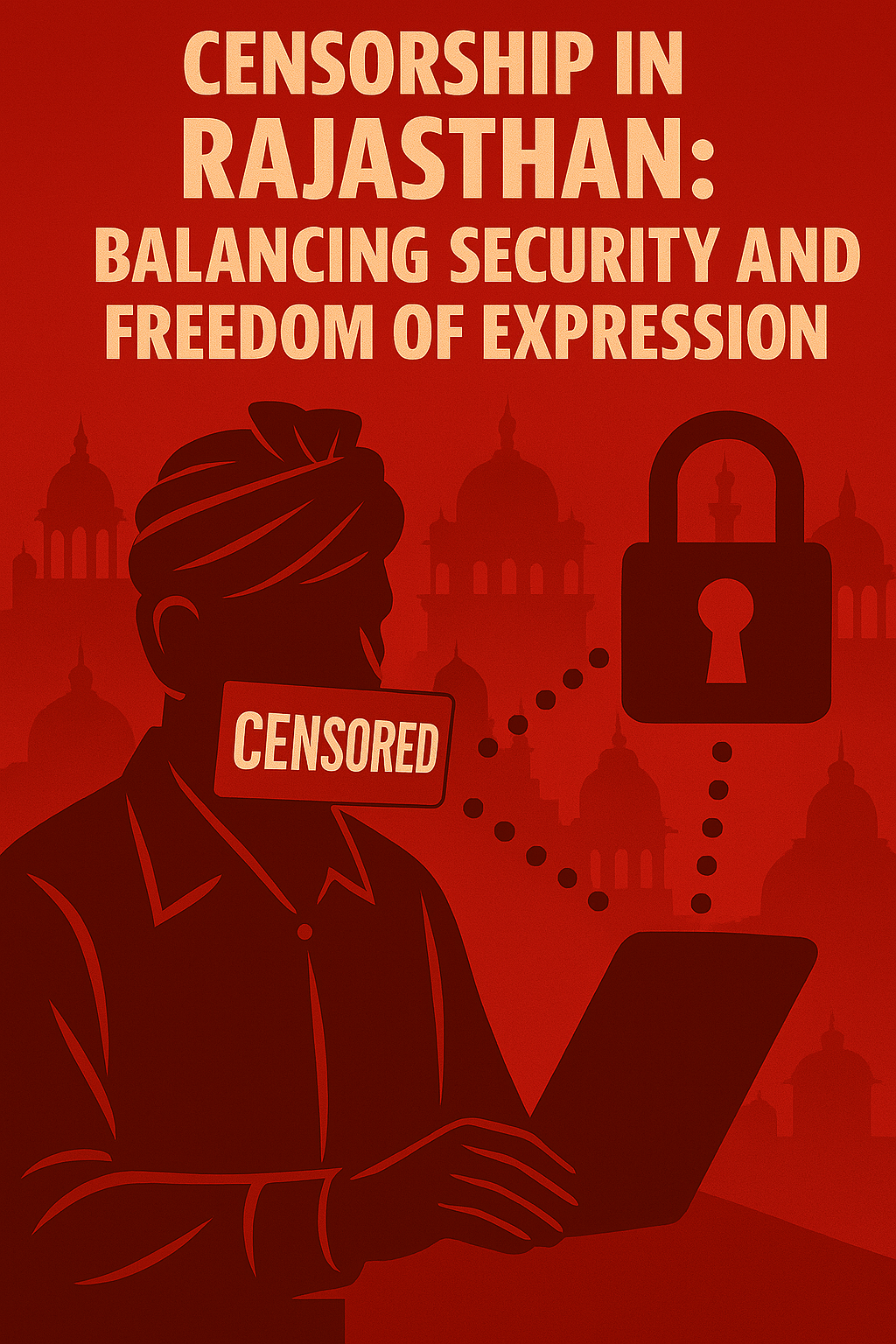Censorship in Rajasthan: Balancing Security and Freedom of Expression

Censorship in Rajasthan: Balancing Security and Freedom of Expression
Censorship in any democratic society is a sensitive issue, as it directly touches upon the freedom of speech and expression, a fundamental right guaranteed under Article 19(1)(a) of the Indian Constitution. In Rajasthan, censorship has manifested primarily through internet shutdowns, especially during times of potential unrest or major public examinations. While authorities argue such measures are necessary to maintain law and order, they have triggered national debates on civil liberties, transparency, and the right to information.
📵 Internet Shutdowns: A Common Tool
Rajasthan is among the Indian states with frequent internet shutdowns, especially in situations such as:
-
Competitive examinations (to prevent cheating),
-
Communal or caste-based tensions (to avoid rumor-mongering and violence),
-
Protests or agitations (to disrupt organizing efforts on social media).
One of the most widely discussed cases occurred in October 2021, when the Rajasthan Administrative Services (RAS) exam was conducted. To prevent mass cheating through digital means, the state government suspended internet services for several hours across many districts. While the intent was to protect the integrity of the examination, this action affected thousands of people, disrupting businesses, essential services, and access to news and emergency information.
🛑 Impact on Citizens
These shutdowns, though temporary, have far-reaching consequences:
-
Students and job seekers suffer from the disruption of online classes or study resources.
-
Small businesses and digital workers face loss of income due to stalled transactions and communication.
-
Emergency services, especially those relying on GPS or mobile apps, are hampered.
-
Journalists and media organizations struggle to report from the ground during such blackouts.
In rural areas of Rajasthan, where digital literacy and connectivity are just beginning to grow, such disruptions further widen the digital divide.
⚖️ Legal and Constitutional Concerns
Though the Temporary Suspension of Telecom Services (Public Emergency or Public Safety) Rules, 2017 provides a legal basis for internet shutdowns, the Supreme Court of India in the Anuradha Bhasin v. Union of India (2020) case ruled that access to the internet is a part of the right to freedom of speech. The Court also emphasized that shutdowns must be proportionate, necessary, and based on clear reasoning.
This judgment has made it imperative for state governments, including Rajasthan, to ensure that shutdowns are not arbitrary and that citizens are informed of the reasons and duration.
A Growing Debate: Security vs. Civil Liberties
The key issue is the delicate balance between ensuring public safety and protecting individual rights. While authorities cite security concerns, civil society groups, digital rights activists, and journalists argue that blanket internet bans are excessive and outdated solutions to modern problems.
In fact, a report by Access Now and the Software Freedom Law Center (SFLC.in) noted that Rajasthan has been among the top Indian states ordering shutdowns since 2018, despite repeated advisories from the central government to explore less intrusive alternatives.
📢 Censorship Beyond Shutdowns
In addition to internet blackouts, there have been concerns around:
-
Withholding government advertising funds from media houses critical of the administration.
-
Pressuring journalists not to cover sensitive political or social topics.
-
Restricting access to public information, especially in rural districts.
Such informal censorship tactics make it harder for the media to function freely, thereby affecting transparency and accountability in governance.
🌐 The Way Forward
Instead of resorting to sweeping shutdowns, experts recommend:
-
Technological interventions like disabling only specific services (e.g., WhatsApp or SMS) instead of the entire internet.
-
Stronger digital education and exam invigilation systems to prevent cheating.
-
Transparent protocols for deciding and announcing shutdowns.
-
Encouraging media freedom by upholding journalistic rights and encouraging ethical reporting.
📝 Conclusion: A Call for Balance
Rajasthan, with its deep democratic roots and vibrant culture, must lead by example. Censorship if necessary must be used sparingly, lawfully, and transparently. While law and order are important, so are citizens’ rights to information, expression, and participation in democratic discourse.
The challenge is not just about managing security but about building trust between the state and its people. A truly empowered society is one where information flows freely, responsibly, and inclusively.
- Goa
- Jammu & Kashmir
- Punjab
- Uttar Pradesh
- Uttarkhand
- Andaman & Nikobar Islands
- Andhra Pradesh
- Karnataka
- Kerala
- Lakshdweep
- Puducherry
- Tamilnadu
- Telangana
- Dadra &Nager Haveli, Daman &Diu
- Himachal Pradesh
- Gujarat
- Madhya Pradesh
- Maharashtra
- Rajasthan
- Legal
- Life Style
- Music
- Prop News
- Sports
- Technology
- SURAKSHA
- Education
- International
- Haryana
- BMA
- Bharat
- Business
- Entertainment
- Fashion & Beauty
- Health & Fitness
- Arunachal Pradesh
- Assam
- Bihar
- Chattisgarh
- Jharkhand
- Ladakh
- Manipur
- Meghalaya
- Mizoram
- Nagaland
- Odisha
- Sikkim
- Tripura
- West Bengal
- Chandigarh
- Delhi - NCR
- Bharat Aawaz
- IINNSIDE
- Business EDGE
- Media Academy



